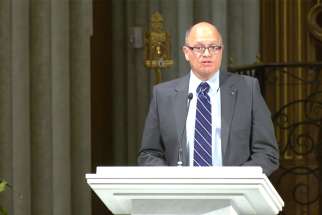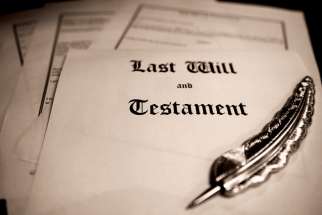Pre-planning for inevitable makes sense
With COVID-19 death tolls and hospitalization numbers a staple on the news daily, the past two years have forced many to consider the inevitable.
Know your Wills
Have you ever wondered what it would be like to “speak” from the grave and tell your loved ones how you would like things handled after you die?
Making a plan that gives back in gratitude
I have always made it a priority to support not only the charity that I have worked with, but also many other charities that serve our greater communities.
The right words for giving
Leaving a bequest to the Church is your legacy to the faith you have cherished during your lifetime. Making sure your wishes are fulfilled means making sure the wording in your Will is correct.
Choosing an executor is no easy task
Naming an estate trustee, commonly known as executor, is one of the most important decisions you will make while preparing a Will.
Minimizing probate fees requires careful planning
Your death may be the end of life, but it’s not the end of the bills. Aside from burial costs, cleaning up the monthly household bills, the executor of the estate will usually be faced with probate fees.
Your guide to understanding Wills
Have you ever wondered what it would be like to “speak” from the grave and tell your loved ones how you would like things handled after you die?
Wills and Codicils — what you need to know
We are all familiar with the term “last Will and testament” but the term “Codicil” is less well known. Derived from the Latin “Cōdicillus,” which means “a little book,” a Codicil is a document that amends a Will.
A Codicil must follow the same formalities as a Will. It must be in writing. Unless it is entirely in the handwriting of the testator or the testatrix (the person making the Will), it must be signed, dated and witnessed by two individuals in the presence of the testator/testatrix.
After an individual makes a Will, he or she may wish to change the Will. Circumstances may have changed or assets previously bequeathed may have been sold. Rather than have the entire Will re-executed, individuals often use a Codicil if the change is small. However, with document processing technology, Codicils are becoming less popular.
Before document processing, Wills were typed. Because of the strict rules regarding the formal execution of a Will, there could be no typographical errors. If an error occurred, the entire page would be retyped.
Otherwise, manual change would have to be initialed by each of the testator/testatrix and the witnesses.
For that reason, it was common to make small changes by Codicil.
Is it Ever Appropriate to Use a Codicil?
There are times when it is never desirable to use a Codicil. These include:
o a change of the guardians or custodian nominated for children;
o a reduction of a bequest;
o removal of a beneficiary.
These are decisions that will inevitably cause embarrassment or hurt for the person removed or excluded.
Rather than have disappointed heirs fretting over what conduct precipitated the change, it is more appropriate to simply do a new Will. Only the last Will is made public. No one need know that another person was selected as a guardian or a legacy was reduced or revoked.
Codicils Precipitating Will Challenges
A change could precipitate a Will challenge. It is not uncommon for excluded individuals to challenge the Codicil on the basis that the change was made based on inaccurate information or on the grounds of duress or undue influence. This could be avoided if the affected individual was unaware that a change had occurred.
Making your Own Codicil
If the change is small, an individual might be tempted to prepare a Codicil where there is an emergency or a lawyer is not available. For example, if someone is in imminent fear of death and was in a remote location, he/ she could prepare a handwritten document to make a change to his/her Will.
Individuals should not make changes to a Will without consulting a lawyer. Lawyers’ fees for preparing Wills are modest compared to fees for contested Wills. Homemade Wills and Codicils are a great source of litigation.
Recently, individuals have prepared Wills or statements of testamentary intent on their computers and send them via e-mail. While a handwritten document will be accepted as a holograph Will, an e-mail or an electronic document is not acceptable, as it has not been signed and witnessed and there is no way to verify that the document was typed by the owner of the e-mail address.
Finally, we have all seen on television a video recording made by a testator/testatrix who wishes to address his/her beneficiaries after his/her death. Video Wills are not acceptable or admissable either as Wills, Codicils or “explanations” to either. The safest way to change a Will is to use a lawyer who will either prepare a new Will or, more rarely now, a Codicil.
(Rocchi is a Partner at Miller Thomson Law Firm.)









